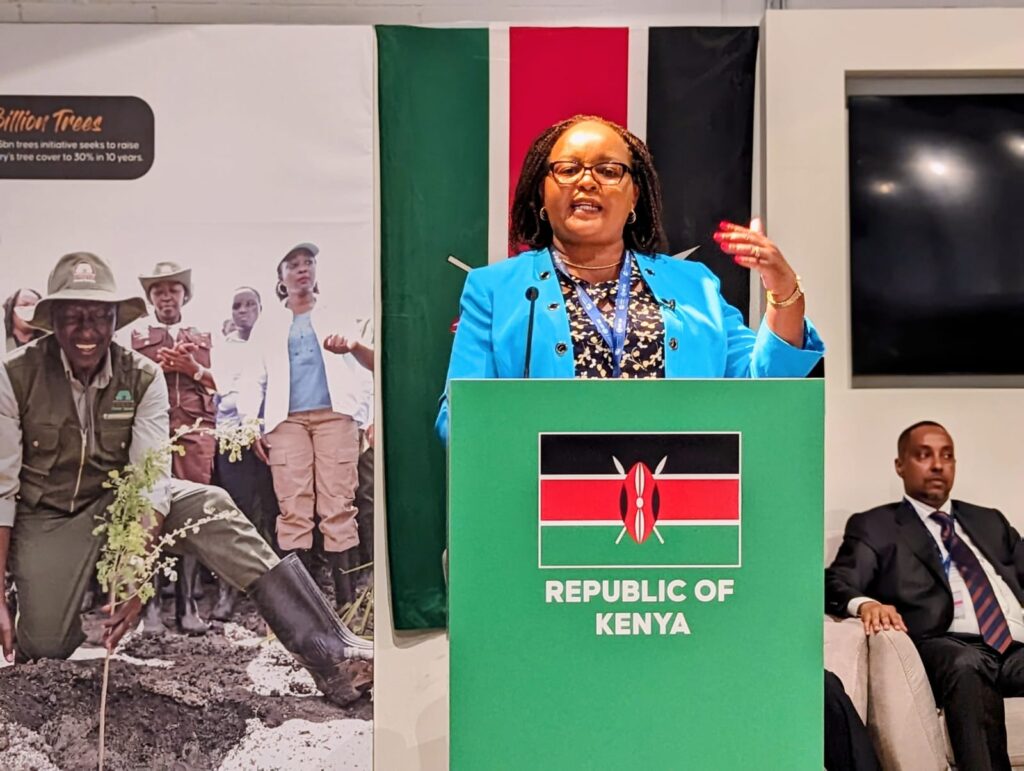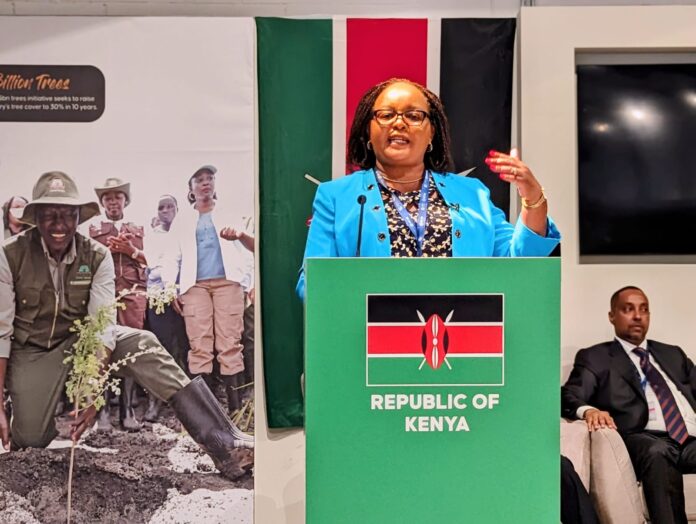By Jane Mugambi
Nairobi, Kenya: Council of Governors (COG) Chair Anne Waiguru has called for coordinated regional strategies to deal with transboundary environmental shifts arising from climate change in East Africa.
Waiguru says that the region has experienced similar far-reaching risks that have caused disruptions and greatly affected lives and livelihoods.
She said as a result of the effects of climate change, agriculture, which is the region’s mainstay, water resources and infrastructure, wildlife, and transport networks have severely been fractured with diseases also on the rise.
The chair said climate change impacts transcend national boundaries and therefore there is an urgent need for a well-coordinated climate change mitigation and adaptation action to address the far-reaching risks.
Speaking during a COP28 side event themed “Domestication of climate actions for the transboundary ecosystem in building resilience and livelihood support systems” in Dubai, UAE, the chair said repercussions of climate change like extreme weather conditions that have caused prolonged drought, floods, and diseases among others extend beyond national borders.

While noting that Kenya has experienced extreme weather events, with prolonged drought occasioned by four failed rain seasons and now El Nino floods, Waiguru said neighboring countries have also not been spared.
“These disruptions have greatly affected lives and livelihoods. Agriculture, which is our mainstay, Water resources, and Infrastructure, Wildlife, and Transport networks are severely fractured. Public Health Impact is also evident through the spread of waterborne diseases,’’ she said.
The Kirinyaga Governor said shifting climate patterns have also been driving the migration of pastoralists in search of safety, water, and grazing lands, thus escalating conflicts over dwindling resources.
While noting that international efforts on climate change mitigation have gained momentum, the chair regretted that concerted and coordinated adaptation action among East African states has been slower.
The governor warned that individual adaptation actions by one country sometimes can generate and transmit risks to neighboring countries, leading to emerging transboundary adaptation risks.
“Unfortunately for us all, nature does not respect our manmade boundaries of Nations. But here in lies our blessing, the opportunity and necessity for coordinated regional strategies to both mitigate and adapt to the transboundary challenges arising from these environmental shifts in East Africa,” she added.
Recognizing the cross-border implications, Waiguru emphasized the need to adhere to the UN Framework Convention on Climate Change (UNFCC) which establishes an international framework for countries to collaborate in tackling climate change.
She said East African countries need binding commitments to emissions reductions and negotiating strategies for achieving them.
The COG chair said Kenya has already aligned its national policies with the EAC legal regional frameworks in initiatives like the National Climate Change Response Strategy, the Climate Change Act, and the National Adaptation Plans.
“At the sub-national level, our 47 County Governments are playing a pivotal role in grounding Climate Action in communities and have enacted policy and legal frameworks that have established County Climate Change Funds which invest approximately Sh. 3 billion of public funds annually towards support of climate actions aligned with local needs,” Waiguru said.
Waiguru said that counties have also institutionalized grassroots county climate change planning committees that are important to the building of adaptive capacity and resilience, contributing to the development of Participatory Climate Risk Assessments (PCRA) and County Climate Action Plans (CCAP).
To build resilience and livelihood support systems within the East African Community (EAC), the Governor recommended that member states should consider Ecosystem-based Approaches by fostering the active involvement of local governments, institutions, and stakeholders as primary actors in adaptation planning.
“As we endeavor to build resilience and livelihood support systems within the East African Community (EAC) let us consider Ecosystem-based Approaches through the strengthening collaboration among sectors responsible for managing ecosystems and those benefiting from ecosystem services and incorporating traditional knowledge and practices, recognizing the unique insights of local communities,” she said.
Additionally, Waiguru said EAC member states should adopt gender-sensitive tools and approaches in adaptation planning to ensure inclusivity and address gender-specific vulnerabilities.














